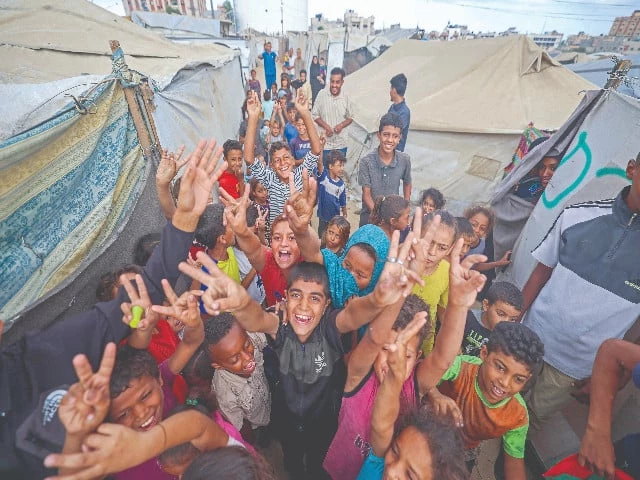Fragile peace dawns over Gaza
Israel, Hamas sign ceasefire agreement; Both sides to free captives, allow aid; Pakistan hails peace opportunity

Israel and Hamas on Thursday signed a landmark ceasefire and hostage-prisoner exchange deal - the first phase of a US-brokered peace plan aimed at ending two years of devastating war in Gaza that has claimed more than 67,000 Palestinian lives and reshaped Middle East politics.
The agreement - mediated by the United States, Qatar, Egypt and Türkiye - commits both sides to halt hostilities, facilitate the release of Israeli hostages and Palestinian prisoners, and allow large-scale humanitarian aid into Gaza.
At the White House, US President Donald Trump called it "the beginning of lasting peace," saying he planned to travel to the Middle East on Sunday to attend a signing ceremony in Egypt and address the Israeli Knesset.
Under the deal, Hamas will release all remaining Israeli hostages within 72 hours of the ceasefire taking effect, while Israel will free hundreds of Palestinian prisoners. "The hostages will be coming back Monday or Tuesday. I'll probably be there," Trump told reporters.
Israel will also begin a partial troop withdrawal from Gaza, allowing convoys of food and medical supplies to enter the enclave, where hundreds of thousands have been displaced by months of bombardment.
Hamas's exiled Gaza chief Khalil al-Hayya said the group had received "assurances from the United States and other mediators that the war has come to a complete end." Prime Minister Benjamin Netanyahu called the deal a "moral victory" for Israel.
However, Israel's far-right coalition partners voiced dissent. Security Minister Itamar Ben-Gvir said he would oppose the agreement and could move to topple the government if Hamas was not dismantled. Finance Minister Bezalel Smotrich said that Hamas "must be destroyed."
Despite political tension in Jerusalem, scenes of jubilation erupted across Israel and Gaza. In Tel Aviv's "Hostages Square," families of abducted Israelis wept and cheered at the news. In southern Gaza, residents welcomed the ceasefire with relief. "Thank God for the end of bloodshed," said Abdul Majeed Abd Rabbo from Khan Younis. "All of Gaza, all of the Arab world, is happy today."
Though sporadic Israeli strikes continued ahead of the formal truce, the pace of combat sharply dropped. The Gaza Health Ministry reported three Palestinians killed on Thursday - a fraction of the toll in previous weeks.
Israeli officials said the ceasefire would take effect within 24 hours of cabinet approval, followed by the staged release of hostages within three days. Of the 48 Israelis still missing in Gaza, 20 are believed alive, 26 presumed dead, and the fate of two remains unknown.
Trump said that "no one will be forced to leave Gaza," but added that disarmament would form part of the next phase. He stressed that US troops in Europe would not be redeployed to the Middle East but could be repositioned "as needed."
Hours after the agreement, diplomats from the US, Europe and Arab nations convened in Paris to discuss Gaza's post-war reconstruction, security and governance. French Foreign Minister Jean-Noël Barrot said the countries outlined their contributions to be integrated into the US plan.
France, Britain, Egypt, Qatar and Türkiye were joined by representatives from Indonesia, Italy and Azerbaijan, who expressed interest in joining a proposed international stabilisation force under a potential UN mandate.
Diplomatic sources said France and Britain had begun informal consultations at the UN on a mission to oversee Hamas's disarmament and support the Palestinian Authority's return to governance in Gaza.
Italian Foreign Minister Antonio Tajani said Rome aimed to be a "major player" in both security and reconstruction. An earlier French proposal called for training 10,000 Palestinian Authority security officers as part of the transition process.
"The Americans will eventually need the Arabs and Europeans to finance, rebuild and help provide security," said an EU diplomat. EU foreign policy chief Kaja Kallas added: "This is the best chance we have right now — but we must ensure the post-war plan is sustainable."
The deal drew broad international praise, with Arab and Western leaders calling it a crucial step toward ending one of the world's deadliest conflicts.
In Islamabad, Pakistan's top leadership hailed the ceasefire as a "historic opportunity" for lasting peace in the Middle East. Prime Minister Shehbaz Sharif lauded Trump's "unwavering commitment to world peace," and praised the "resolute and wise" leaders of Qatar, Egypt and Türkiye.
"The announcement of an agreement that will bring an end to the genocide in Gaza is a historic opportunity," he said. "Most of all, we must pay tribute to the Palestinian people, who have suffered in an unprecedented manner — suffering that should never be repeated."
Sharif also condemned recent provocations at Masjid Al-Aqsa, urging the world to hold "occupiers and illegal settlers accountable" and prevent any actions that could undermine the fragile peace.
Deputy Prime Minister Ishaq Dar welcomed the "first phase" of the Gaza peace plan, which includes an immediate ceasefire, prisoner exchange and humanitarian access. "We commend President Trump, as well as Qatar, Egypt and Türkiye, for their efforts," Dar wrote on X.
Western and Arab nations will reconvene in Paris in the coming weeks to finalise frameworks for Gaza's reconstruction and post-war administration, including financing mechanisms and a possible peacekeeping deployment.



















COMMENTS
Comments are moderated and generally will be posted if they are on-topic and not abusive.
For more information, please see our Comments FAQ